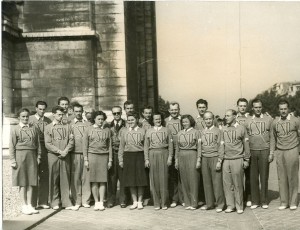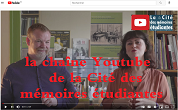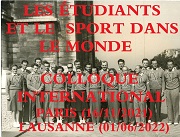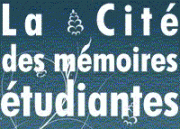-
AGENDA
Fév28sam14 h 00 min La 4e internationale et « la rad... @ La contemporaineLa 4e internationale et « la rad... @ La contemporaineFév 28 @ 14 h 00 min – 18 h 00 min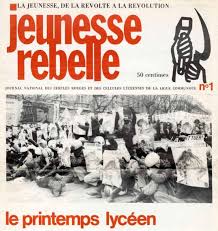 Journal du secteur lycéen de la LC et des cercles rouge lycéens, février 1971 samedi 28 à 14 h à La contemporaine. Robi Morder (Germe, chercheur associé au laboratoire printemps (UVSQ Paris Saclay), membre du[...]
Journal du secteur lycéen de la LC et des cercles rouge lycéens, février 1971 samedi 28 à 14 h à La contemporaine. Robi Morder (Germe, chercheur associé au laboratoire printemps (UVSQ Paris Saclay), membre du[...] CHAINE YOUTUBE DE LA CITE
SEMINAIRES
COLLOQUE 2021 2022 SPORT UNIVERSITAIRE
Catégories
- appel à contributions
- archives et mémoires
- axes de recherche
- cahiers du germe
- collection germe aux éditions Syllepse
- dans d'autres éditions
- dictionnaire biographique et prosopographie
- internationale
- La lettre électronique
- mouvement étudiant et jeunesse
- mouvement étudiant et milieu étudiant
- mouvement, étudiant, mouvements sociaux et société
- mouvements étudiants et institution universitaire
- Non classé
- notes de lecture
- séminaires
- vie du germe
Étudier les mouvements étudiants
Les étudiant·e·s et les sports dans le monde du 19e siècle à nos jours. Appel à contribution/Call for papers
Students and sports in the world from the 19th century to the present day: Actors, institutions, practices
Paris, 16 novembre 2021 – Lausanne, 1er juin 2022
L’Institut des sciences du sport de l’Université de Lausanne (ISSUL), le GERME (Groupe d’études et de recherche sur les mouvements étudiants) et la Cité des mémoires étudiantes lancent un appel à communication pour une double journée d’études internationale consacrée à l’histoire des étudiant·es et du sport. La première se tiendra à Paris le mardi 16 novembre 2021, juste avant la 13e Journée « Archives, recherches et mémoires étudiantes » organisée par la Cité des mémoires étudiantes & le GERME (chaque 17 novembre, journée internationale de l’étudiant·e). La seconde aura lieu à l’Université de Lausanne le mercredi 1er juin 2022, soit le jour anniversaire de la création de la FISU qui a dorénavant son siège dans le même bâtiment que l’ISSUL.
APPEL A COMMUNICATION (Date limite: 15 juillet 2021) :
FRANCAIS / ENGLISH BELOW PDF téléchargeable
 Voués par définition au travail de l’esprit à des fins de formation supérieure et d’intégration au sein des élites ou, plus largement, de la société, les étudiants occupent une position singulière et éphémère dans l’espace social entre classe d’âge, mouvement social et groupe intellectuel. Aussi, leur histoire du XIXe siècle à nos jours participe autant de l’histoire des jeunesses, des mouvements sociaux et des élites que de l’histoire sociale ou de l’éducation. Il ne va donc pas de soi d’envisager leur trajectoire, leur formation et leur sociabilité du point de vue de l’histoire des cultures corporelles et sportives. Bien souvent pourtant, les sports ont été codifiés, institutionnalisés et diffusés par des étudiants européens et nord-américains, avant d’être repris et imités par leurs camarades sur les autres continents. Les pratiques sportives sont ainsi devenues un moyen comme un autre d’affirmer son appartenance à la communauté estudiantine et de répondre à ses besoins de loisir en dehors de la formation intellectuelle. Développer un entre soi masculin et viril, affirmer sportivement l’identité de son université, former une élite performante sur le plan non seulement intellectuel mais aussi physique, se déplacer et même voyager pour rencontrer des athlètes issus de clubs universitaires concurrents, telles sont quelques-unes des raisons du succès des sports parmi les étudiants. Quant aux étudiantes, peu nombreuses avant 1914, leur acculturation sportive et leur affirmation identitaire par le sport au cours du 20e siècle restent encore peu étudiées.
Voués par définition au travail de l’esprit à des fins de formation supérieure et d’intégration au sein des élites ou, plus largement, de la société, les étudiants occupent une position singulière et éphémère dans l’espace social entre classe d’âge, mouvement social et groupe intellectuel. Aussi, leur histoire du XIXe siècle à nos jours participe autant de l’histoire des jeunesses, des mouvements sociaux et des élites que de l’histoire sociale ou de l’éducation. Il ne va donc pas de soi d’envisager leur trajectoire, leur formation et leur sociabilité du point de vue de l’histoire des cultures corporelles et sportives. Bien souvent pourtant, les sports ont été codifiés, institutionnalisés et diffusés par des étudiants européens et nord-américains, avant d’être repris et imités par leurs camarades sur les autres continents. Les pratiques sportives sont ainsi devenues un moyen comme un autre d’affirmer son appartenance à la communauté estudiantine et de répondre à ses besoins de loisir en dehors de la formation intellectuelle. Développer un entre soi masculin et viril, affirmer sportivement l’identité de son université, former une élite performante sur le plan non seulement intellectuel mais aussi physique, se déplacer et même voyager pour rencontrer des athlètes issus de clubs universitaires concurrents, telles sont quelques-unes des raisons du succès des sports parmi les étudiants. Quant aux étudiantes, peu nombreuses avant 1914, leur acculturation sportive et leur affirmation identitaire par le sport au cours du 20e siècle restent encore peu étudiées.
De fait, les pratiques et cultures sportives positionnent les étudiant-e-s au croisement de différentes échelles nationale, internationale et transnationale. L’idée de rencontres sportives régulières entre étudiants de nations différentes est émise pour la première fois en 1892 par Hodgson Pratt lors du Congrès de la Paix à Rome. Elle sera reprise quelques jours plus tard par le jeune parisien Pierre de Coubertin qui, sous la formule de « jeux olympiques modernes », rêve de compétitions ouvertes non plus aux seuls étudiants mais aux sportsmen du monde entier. Si de premiers groupements d’échelle nationale sont constitués à compter de 1907, il faut attendre 1923 pour que le Français Jean Petitjean organise à Paris les premiers Jeux mondiaux universitaires. Dans l’entre-deux-guerres, puis au cours de la Guerre froide, les rencontres sportives internationales entre étudiants donnent souvent lieu à des formes de rivalité entre États et entre modèles socio-politiques. Il en est de même pour les organisations qui les encadrent. Si la Fédération internationale du sport universitaire (FISU) est fondée en 1949 contre la politisation du sport par la nouvelle Union internationale des étudiants (UIE) dorénavant contrôlée par l’URSS et ses alliés, la réunification du mouvement sportif estudiantin surviendra somme toute rapidement, en 1959. Toutefois, les rencontres sportives estudiantines ne sauraient être réduites à des manifestations de soft power car elles ont aussi permis des élans de fraternité et offert des espaces alternatifs de coopération.
Dans les travaux universitaires de référence sur les étudiants et leurs internationales (Moulinier 2002, Kotek 2003, Rüegg 2011, Laqua 2017, Legois, Monchablon & Morder, 2007), le sport universitaire n’est guère abordé. Le constat est quasi similaire dans le champ de l’histoire du sport hormis les travaux de référence sur la contribution des étudiants britanniques ou américains à l’invention des sports tout au long du 19e siècle (Mangan, 1981 ; Smith, 2000). Pour le continent européen on pourra signaler quelques publications qui portent souvent sur les années 1930-1950 (Impiglia & Lang 1997, Attali et Saint-Martin 2013, Quin 2016, Mirabet & Pujadas 2018).
À la veille du centenaire des premiers Jeux mondiaux universitaires (2023), cette double journée d’études vise à décloisonner une histoire très occidentale, masculine et concentrée sur les années pionnières ou bien de grandes tensions diplomatiques. C’est pourquoi les communications portant sur les étudiantes, sur l’avant 1914 et sur les décennies 1960 et suivantes seront particulièrement bienvenues, tout comme celles abordant les espaces est-européen, scandinave, latino-américain, africain et asiatique.
Trois axes de recherche seront privilégiés :
- une histoire des acteurs qu’ils soient étudiants ou liés à leur université (sportifs/ves ordinaires, champions, dirigeants) qui prenne en considération autant leur état d’étudiant que leur trajectoire de vie et professionnelle,
- une histoire des institutions (clubs, fédérations nationales, organisations étudiantes) envisagée dans la longue durée ou bien consacrée à des moments significatifs,
- une histoire des pratiques sportives privilégiées par les étudiant-e-s au regard des cultures sportives dominantes dans l’espace social et national qui les environne.
Les communications seront réparties entre les deux journées de novembre 2021 et de juin 2022 en fonction des logiques scientifiques. Les intervenants s’exprimeront en français ou en anglais avec un support visuel traduit dans l’autre langue.
Nous invitons les historiens à soumettre leurs propositions, en encourageant tout particulièrement les contributions en dehors de l’histoire du sport, aussi bien qu’en sciences sociales (sciences politiques, sociologie, anthropologie, études culturelles).
Modalités de soumission. Langue : Français ou Anglais . Taille : 300 mots maximum, avec un court paragraphe biographique en sus . Adresse d’envoi : sportunivcolloque@gmail.com
Date limite :15 juin 15 juillet 2021
Comité d’organisation :
Lidia Lesnykh et Patrick Clastres pour l’Université de Lausanne
Matthieu Gillabert pour l’Université de Fribourg
Ioânna Kasapi pour la Cité des mémoires étudiantes et le GERME (Groupe d’études et de recherche sur les mouvements étudiants)
Jean-Philippe Legois pour la Cité des mémoires étudiantes
Robi Morder pour le GERME
Comité scientifique :
Michael Attali (Université de Rennes, FRA)
Nicolas Bancel (Université de Lausanne, SUI)
Laurent Besse (Université de Tours, FRA)
Daphné Bolz (Université de Rouen, EU Research Fellow)
Florence Carpentier (Université de Lausanne, SUI)
Sigolène Couchot-Schiex (CY Cergy Paris Université, FRA)
Olivier Dard (Sorbonne Université, FRA)
Paul Dietschy (Université de Besançon, FRA)
Patrizia Dogliani (Università di Bologna, ITA)
Sylvain Dufraisse (Université de Nantes, FRA)
Christiane Eisenberg (Humboldt Universität zu Berlin, GER)
Laurent Gutierrez (Université Paris Nanterre, FRA)
Dzovinar Kévonian (Université de Paris Nanterre, FRA)
Joël Kotek (Université Libre de Bruxelles, BEL)
Pascal Ory (Université de Paris 1 Panthéon Sorbonne, FRA)
Martin Polley (De Montfort University, GBR)
Emmanuel Porte (INJEP, FRA)
Xavier Pujadas (Universitat Ramon Llull, ESP)
Grégory Quin (Université de Lausanne, SUI)
Caroline Rolland-Diamond (Université Paris-Nanterre, FRA)
Nicola Sbetti (Università di Bologna, ITA)
Jean Saint-Martin (Université de Strasbourg, FRA)
Bibliographie indicative
Attali, Michaël, Saint-Martin, Jean, “Le sport universitaire et l’affirmation de l’identité étudiante (19e-20e siècles)” dans Legois, Jean-Philippe, Monchablon, Alain, Morder, Robi (dir.), Cent ans de mouvements étudiants, Paris, Syllepse, 2007, p. 265-274.
Attali, Michaël, Saint-Martin, Jean, “The Mission of Scholastic Sport in the Expansion of Sport Practice in France: The Issues Involving Development and Collateral Effects (1938–1950)”, The International Journal of the History of Sport, 2013/9 (30), p. 976-983.
Gallien, Claude-Louis, Cent ans de PUC, Biarritz, Atlantica, 2006.
Impiglia, Marco, Lang, Peter, « Goliardi in gara. I giochi mondiali universitari prima delle Universiadi », Lancillotto e nausica : critica e storia dello sport, 1997 (nº1), p.8-39
Kotek, Joël. La Jeune garde : entre KGB et CIA, la jeunesse mondiale, enjeu des relations internationales, 1917-1989, Paris, Seuil, 2003.
Laqua, Daniel, “Activism in the ‘Students’ League of Nations’: International Student Politics and the Confédération Internationale des Étudiants, 1919-1939“, The English Historical Review, 2017/132 (556), p.605-637.
Legois, Jean-Philippe, Monchablon, Alain, Morder, Robi (dir.), Cent ans de mouvements étudiants, Paris, Syllepse, 2007.
Mangan, James, Athleticism in the Victorian and Edwardian Public School, Cambridge, Cambridge University Press, 1981.
Mirabet, Raquel, Pujadas, Xavier, “Intellectuals and Warriors: The Ideological and Political Basis of Francoist University Sport, 1933-1946”, The International Journal of the History of Sport, 2018/11 (35), p. 1176-1197.
Moulinier, Pierre, La naissance de l’étudiant moderne : XIXe siècle, Paris, Belin, 2002.
Rüegg, Walter (dir.), A history of the university in Europe Vol. 3, Universities in the nineteenth and early twentieth centuries: (1800-1945) et Vol.4, Universities since 1945, Cambridge, Cambridge University Press, 2011.
Schwartz, Eugene G., American Students Organize: Founding the National Student Association After World War II: An Anthology and Sourcebook, Praeger Publishers Inc., 2006.
Quin, Grégory, L’odyssée du sport universitaire lausannois : entre compétition et sport-santé, Paris, Glyphe, 2016.
Smith, Rodney K., « A Brief History of the National Collegiate Athletic Association’s Role in Regulating Intercollegiate Athletics », Marq uette Sports Law Review, 2000/1 (11), p. 9‑22.
Students and sports in the world from the 19th century to the present day: Actors, institutions, practices
Paris, November 16, 2021- Lausanne, June 1, 2022
Call for papers (Submission deadline: July 15, 2021)
The Institute of Sport Sciences of the University of Lausanne (ISSUL), the GERME (Groupe d’études et de recherche sur les mouvements étudiants – Study and Research Group on Student Movements) and the Cité des mémoires étudiantes (Paris) are launching a call for papers for a two-days international conference devoted to the history of male and female students and sport.
The first will be held in Paris on Tuesday, November 16th, 2021, just before the 13th “Archives, research and student memories” Day organized by the Cité des Mémoires étudiantes & the GERME. The second will take place at the University of Lausanne on Wednesday, June 1st, 2022, the anniversary of the creation of FISU which now has its headquarters in the same building as the ISSUL.
Students occupy a unique and ephemeral position in the social space between age groups, social movement and the intellectual group as they are, by definition, dedicated to the intellectual work for the purposes of higher education and integration within the elites or, more broadly, the society. From the nineteenth century to the present day, their history was entangled with the history of youth, social movements and elites as well as with the social history or education history. Therefore, it is far from obvious to consider their trajectory, their training and their sociability from the point of view of the history of bodily and sports cultures. However, very often, sports were codified, institutionalized and broadcast by European and North American students, before being picked up and imitated by their peers on other continents. Thus, sports practices became means like any other to assert belonging to the student community and meet their leisure needs outside of intellectual training.
These are only some of the reasons for the success of sports among students: to develop their masculinity and virility, to affirm the identity of their university through sports, to train an elite that performs not only intellectually but also physically, to move and even travel to meet athletes from competing university clubs. Regarding the female students, who were few before 1914, their acculturation in sport and their affirmation of identity through sport during the twentieth century remained subatantially out of historical scholarship considerations.
Sports activities and cultures position students at the crossroads of different national, international and transnational scales. The idea of systematic sports meetings between students from different nations was first put forward by Hodgson Pratt in 1892 at the Peace Congress in Rome. A few days later young Parisian Pierre de Coubertin took up this idea under the formula of « modern Olympic games ». He actually dreamt of competitions open not only to students but to sportsmen from all over the world. Although national sporting groups appeared from 1907, it was not until 1923 that the French Jean Petitjean organized the first World University Games in Paris. In the interwar period and then during the Cold War, international sports meetings between students often gave rise to rivalry between states and between socio-political models. It is the same for the organizations which supervise them. The International Federation of University Sports (FISU) was founded in 1949 in reaction to the political use of sport by the International Union of Students (UIE), controlled by the USSR and its allies. The reunification of the student sports movement occured in 1959. However, student sports meetings cannot be reduced to soft power as they also allowed fraternity outbursts and offered alternative spaces for cooperation.
The academic reference works on students and their international organisations hardly discussed university sport (Moulinier 2002, Kotek 2003, Rüegg 2011, Laqua 2017, Legois, Monchablon & Morder, 2007). The situation is similar in the field of the history of sport except for the reference works on the British or American students’ contribution to the invention of sports since the 19th century (Mangan, 2000 ; Polley, 2000 ; Smith, 2000). For the European continent, we can point out a few publications which often relate to the years 1930-1950 (Impiglia & Lang 1997, Attali and Saint-Martin 2013, Quin 2016, Mirabet & Pujadas 2018).
On the eve of the centenary of the first World University Games (2023), these two-days studies aim to decompartmentalize a history that is too much Western, masculine, and focused on the pioneer years or great diplomatic tensions. This is why papers dealing with female students, with periods before 1914 and over the 1960s and beyond will be particularly welcome, as will papers dealing with the East European, Scandinavian, Latin American, African and Asian spaces.
Three research axes will be privileged:
- a history of the actors, whether they are students or linked to their university (ordinary athletes, champions, managers) which takes into account both their student status and their social life and professional trajectory,
- a history of institutions (clubs, national federations, student organizations) planned over the long term or devoted to significant moments,
- a history of sports practices favoured by students concerning the dominant sports cultures in the social and national spaces surrounding them.
Communications will be distributed between the two days of November 2021 and June 2022 according to scientific logic. Speakers will speak in French or English with visual support translated into the other language.
We welcome papers from historians, including those outside the field of sport history, as well as from researchers across the social sciences, namely anthropology, cultural studies, political science and sociology. Proposals can be submitted in French or in English (maximum 300 words) along with a paragraph with biographical information, should be sent by email to:
Submission deadline: juin 15 July 15, 2021
